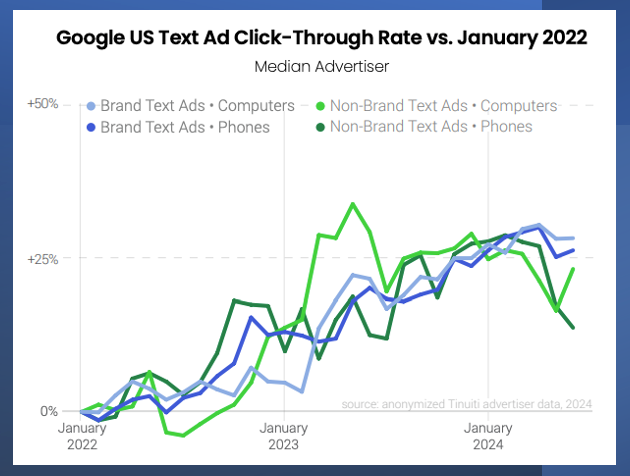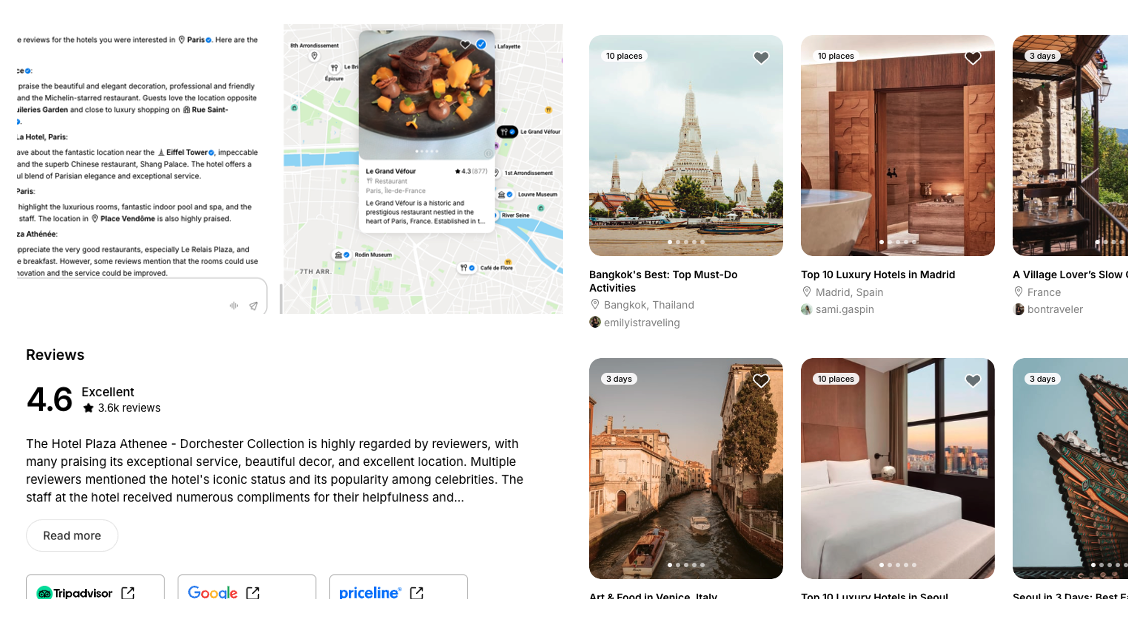AIOs Hurt Ad Clicks, Travel Mindtripping, Bing: We Took Share

Google AIOs Depress Ad Clicks
Based on an early analysis, Tinuiti found that AI Overviews depressed ad clicks on non-branded keyword mobile SERPs. This comes from their Q2 digital ads benchmarking report. According to the findings, "as Google rolled out AIOs to all US users in May, non-brand text ads on both computers and phones saw a meaningful drop in click-through rate (CTR) compared to April, and a much larger drop than that seen for brand keywords." When AIOs were "dialed back" shortly thereafter, "CTR for other segments recovered, but it did not for non-brand phone text ads." The report goes on to heavily qualify its findings and suggest multiple factors may be involved in the observed CTR drop. However, these data suggest that another motivation for the AIO pullback may have been an adverse impact on revenue and not just bad PR. Another finding from the report is that ad clicks were down but ad spending is up: "Spending on Google search text ads was up 13% Y/Y in Q2 2024, which was driven almost entirely by CPC growth."

Our take:
- It would appear that increased ad prices are primarily driving Google's ad-revenue growth, rather than click volume growth.
- Google seems to be doing lots of things to increase search volume (and show more ads) but might not be helping with CTR.
- Before we see AIOs ramp back up (after fixing hallucination and misinformation), Google needs to solve AIO monetization.
Travel Mindtripping
At Google's developer conference in May, the company demonstrated AI-based conversational search for complex queries. It allowed users to ask multi-part queries and follow-up questions. Among other scenarios, this would be useful for travel planning. However that experience has yet to materialize. But a new AI travel site Mindtrip offers a pretty compelling version of that and points the way to the future of "travel search." I've only used it twice and haven't verified the accuracy or quality of the underlying data. But I like it. It's primarily a conversational UI, like ChatGPT. But it also includes a socially curated "explore" area for trip inspiration. Right now to plan a trip to Paris, for example, I need to do a bunch of discrete searches on Google – although there is a generic AI Overview sample itinerary. Mindtrip gives you the ability to do "faceted search," starting broadly and then narrowing and refining in the chat UI without initiating a new query. If signed in, it saves your searches so you can engage in multiple planning sessions without having to start over. The site uses Google Maps so you get the benefit of all that data. And you can book hotels through affiliate partners such as Tripadvisor, Priceline, Agoda and others. It's a pretty complete experience.

Our take:
- The business model is going to be affiliate revenue (already), ads (probably) and premium services (maybe).
- Mindtrip allows you say, "I want a 4-star hotel, under $200 per night with more than 4.5 stars, close to the heart of Paris." Google can't really deal with that query efficiently.
- The quality of the underlying data and recommendations need to be tested vs. other travel sites. But the data seem to be pretty complete.
MSFT: Bing Took Share (from Google)
Earlier this week Microsoft announced better-than-expected quarterly revenues of $64.7 billion, up 15% year-over-year. However, Search and News ad revenues were up 19%. That's a roughly 10 point gain vs. a year ago and a 7 point gain sequentially. Microsoft CEO Satya Nadella, on the company's earnings call, said "We are ensuring that Bing, Edge, and Copilot are collectively driving more engagement and value to end-users, publishers, and advertisers ... we again took share across Bing and Edge." He didn't provide any third party data or specific discussion about taking share (presumably from Google) but he made the claim. Nadella added, "Our share gains accelerated this year, driven by AI." In that context he also touted the recently showcased Bing AI-organized SERPs – an arguably more thoughtful take on Google's AI organized pages. If we look at StatCounter data, which may not be entirely accurate, it shows a very slight search marketshare gain for Bing over time (about 1 point since last year). Microsoft CFO Amy Hood previously said that one point of search share could translate into $2 billion of new search revenue for the company.

Our take:
- Microsoft is telling a strong AI story across company divisions.
- Zooming out, as they say, Google is winning in search but MSFT is winning on Wall Street. Redmond is worth $1T more than Google today.
- Indeed, both Google and Apple "disrupted" Microsoft in major ways but the company is more valuable today than it was as a "monopoly."
Recent Analysis
- Google Completes GBP Reviews for LSAs Swap in EU, by Mike Blumenthal.
- Near Media podcast episode 167: Reframing how search ranking works, Google doubles down on income, voice search set for a comeback?
- ICYMI: The Google Local SERP Today, by Mike Blumenthal.
Short Takes
- Simple fix for a broken booking/appointment link on GBP.
- Google ads cool historical landmarks data to Maps using AR.
- The Waze-ification of Google Maps.
- Siri sees marginal improvement in iOS 18.1 according to early reports.
- Wix AI tool will do the blogging for you (mostly).
- Poor local SEO advice can be very costly.
- Sort products in AI Overviews by attributes.
- How is "generative engine optimization" different from SEO?
- Optimizing video in a post-Google API leak world.
- Reddit CEO reveals why scrapers blocked: to get them to pay for content.
- Social media becoming a driver of product discovery and commerce.
- Amazon: Adding AI to Just Walk Out appears to give it new life.
- Google remains a "most trusted brand" in the US.
Listen to our latest podcast.

How can we make this better? Email us with suggestions and recommendations.

